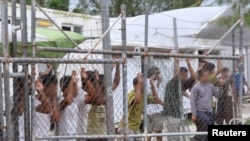Australia’s Prime Minister Malcolm Turnbull has defended his government’s tough asylum policies at a United Nations refugee summit in New York. However, activists are demanding that Australia close its controversial migrant camps in the South Pacific.
The United Nations General Assembly is looking to find a better way to help more than 65 million people who are displaced around the world.
Australian Prime Minister Malcolm Turnbull told delegates his country’s strict border control measures have created an orderly process for accepting asylum seekers.
Those who try to reach Australia by sea are taken to processing camps in Papua New Guinea and Nauru.
The government believes the offshore policy has deterred other migrants from making the hazardous sea crossing to Australia from countries such as Indonesia.
Turnbull said the strict approach is working.
“The need to build community support for migration has never been clearer. Australia’s experience bears this out. Addressing irregular migration through secure borders has been essential in creating the confidence that the government can manage migration in a way that mitigates risk and focuses humanitarian assistance on those who need it most. This has had a direct impact on our ability to provide generous and effective support to refugees,” said Turnbull.
But critics argue that conditions in the offshore camps in the South Pacific are inhumane and the indefinite detention of some inmates is akin to torture.
Graham Thom, Australia refugee coordinator for the international rights group Amnesty International, has traveled to New York to lobby for change to Canberra’s asylum policies.
He wants the camps in Papua New Guinea and Nauru to close, and for Australia to be more generous to those fleeing persecution.
“We need to be getting all of the 12,000 Syrians that we committed to resettle over a year ago to Australia and we need to then up our program from 13,750 to a program closer to thirty [thousand] and that is what we were doing during the boat crisis when there Vietnamese were fleeing in the late ‘70s, early ‘80s. This crisis now is worse than any crisis we have ever seen before,” said Thom.
Australia grants refugee visas to just under 14,000 people each year under various international agreements. Opinion polls suggest that strict border control measures and the offshore processing of asylum seekers have broad public support in Australia, a country where about a quarter of the population was born overseas.




